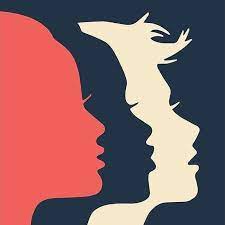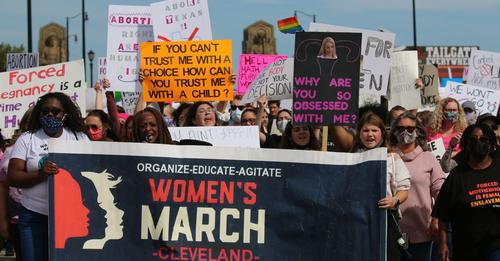Coleman said at the press conference at Angie's Soul Food Cafe with other women's march advocates and community women leaders that the group, a sister march under Women's March Washington, is following the lead of the national march, the umbrella to the sister marches that has postponed its anniversary march in Washington D.C. Hundreds of tentative sister marches have also been postponed because of the Omicron Variant.
"Women March Cleveland's annual march is merely postponed due to the Omicron Variant and when we return to protest before the midterm elections on issues of public concern for the betterment of women we will bring thousands of women to the streets as we have done in the past," Coleman told clevelandurbannews.com and www.kathywraycolemanonlinenewsblog.com, Ohio's Black digital news leader
Coleman has organized women's marches in Cleveland since 2018, and she also leads the Imperial Women Coalition, a grassroots women's rights group that stresses support for Black women in Cleveland.
Other members of Women's March Cleveland coalition group speaking at Fridays' press conference at Angie's were:
Elaine Gohlstin, president, Black Women's PAC of greater Cleveland
Activist Cheryl Lessin of Refuse Fascism
Cuyahoga County Councilwoman Meredith Turner
Activist Delores Gray, Brickhouse Wellness Center for Women
Activist Alfred Porter Jr, president, Black on Black Crime Inc.
Activist Jessica Pantz, domestic violence survivor
Activist Laura Cowan, Laura Cowan Foundation, domestic violence survivor and CNN hero
Activist Dorothy Walwyn, Fathers Lives Matter
Elain Vance, National Council Council of Negro Women
County Councilwoman Meredith Turner, who was recently chosen by Cuyahoga County Democratic Party leaders to replace now 11th Congressional District Congresswoman Shontel Brown on county council after Brown vacated the seat to join Congress, pushed for the passage of Aisha's Law, a bill pending in the Ohio state legislature that expands domestic violence protections. The bill was introduced in the state legislature following the brutal murder by former county judge Lance Mason of his ex-wife Aisha Mason. And Elaine Gohlstin spoke on voting rights and chastised Congress for failing to pass two voting rights bills earlier this week, namely the John Lewis Voting Rights Advancement Act and the Freedom to Vote Act.
"We want these voting rights bills passed in Congress," said Gohlstin, who added that the Civil Rights Act of 1965 is at risk.
A longtime community activist, Cheryl Lessin said that she had one of two abortions in 1972 and later remarried. She highlighted that Jan 22 is the 49th anniversary of Roe v. Wade, the landmark U.S. Supreme court decision that made abortion legal nationwide.
"Abortion rights are under attack," said Lessin.
Coming from a meeting, Cleveland Ward 7 Councilwoman Stephanie Howse, a former state representative and women's advocate who championed women's causes as a state legislator, including reproductive rights, stopped by the event to support the women.
The postponement of the annual women's march this year comes behind a mass march for reproductive rights held by Women's March Washington and in more than 650 city's nationwide on Oct 2, 2021, Cleveland bringing some 2,500 women to the streets to protest on that day. It was the largest crowd of protesters in Cleveland since the George Floyd rally in May of 2020, and certainly one of the biggest nationwide since the still raging COVID-19 pandemic hit the U.S. with a vengeance in the winter of 2020.
The inaugural Women's March was a nationwide protest held on Jan 21, 2017, the day after the inauguration of then president Donald Trump. It was spearheaded by Women's March on Washington prompted in part by statements he made during and after his campaign for president against then Democratic presidential nominee Hillary Clinton. It was the largest single-day protest in U.S. history with nearly five million women and their supporters marching in sister marches in major and other cities nationwide. In Cleveland that year some 15,000 women and their supporters protested.
The goal of the annual marches is to advocate for legislation and policies regarding human rights and other issues, including women's rights, educational equity, reproductive rights, environmental justice, LGBTQ rights, racial inequality, poverty, freedom of religion, workers' rights, equal pay and police and criminal justice reform.
Now led by executive director Rachael O'Leary Carmona, Women's March National, a non profit organization for women's rights, is governed by a 16-member board of directors. Its national organizing director is Kate Shapiro, a grassroots organizer.










